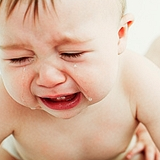- Hunger and/or thirst
- A wet nappy
- Feeling too hot or cold
- Fear or overstimulation
- Pain
- Need for comfort
- Colic
My baby keeps crying. What should I do?

babyadmin |
Without language, crying is the only way your newborn is able to communicate their needs to you. It is a normal reflex that attracts attention from the caregiver enough to have them respond. Biologically, the sound of a baby’s cry is enough to trigger a reflex in the mother that allows her to lactate and want to nurse her child.
It may be overwhelming for new parents in trying to figure out what need to be done to soothe their baby. Especially in the first 2 months or so, it can quickly become stressful if there seems to be nothing that can soothe the crying baby.
Possible reasons for crying
There are many reasons why a baby would cry. The way in which they cry may be dependant on their temperament. Some reasons for crying include:
